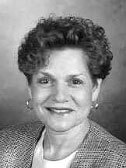Partners of public workers are one step closer to getting health care coverage
On February 17 the Rockland County Legislature voted to extend health care benefits to the domestic partners of the county’s 2,700-member municipal workforce. Republican C. Scott Vanderhoef, the county executive, has indicated he will sign the legislation, making Rockland only one of a handful of New York counties to include the gay and lesbian partners of public employees in taxpayer-financed health plans.
The benefits initiative passed on a 9-4 vote, with four legislators of the 17-member body absent. Democrat Ellen Jaffe, the bill’s author who represents parts of Suffern and Chestnut Ridge, said that the vote followed a limited debate in which another Democrat, Philip Soskin, rose against the bill and a variety of community members, including gay and lesbian residents, spoke in favor.
“I came into last night’s session with 8 votes and once I had the ninth, I decided to go forward and not speak on the bill, but ask for an immediate vote,” said Jaffe.
The idea for the bill arose during various “backyard fence” conversations that Jaffe conducted with gay and lesbian friends and constituents. Once it became clear last year that other legislators and the county executive supported the notion of a benefit extension, Jaffe introduced a bill and began lining up supporters.
Sue Sherwood, chief of staff to Vanderhoef, said that her boss will sign the bill sooner rather than later during the 30-day period reserved for the executive to handle pending legislation. Following Vanderhoef’s signature, said Sherwood, she anticipates no more than a dozen workers, including straight employees, to step forward and claim health benefits for their partners.
Sherwood echoed Jaffe’s remarks that while the legislation faced opposition, a bipartisan effort fashioned the bill and ensured its passage.
Salvatore Corallo, who voted against the bill, leads the Democratic-controlled legislature.
“He told me early on that he would not support the bill, but he would not block its passage,” said Jaffe.
The national partisan divide over same-sex couples’ rights, with Republicans generally opposing and Democrats favoring initiatives such as civil unions, does not exist in many localities like Rockland County, where local items, not idealogical battles, dominate the legislative agenda.
In Rockland, for example, legislators like Philip Soskin, a Democrat, opposed the benefits bill, while Gerold Bierker, a Republican, actively supported it. (Bierker, a longtime youth advocate, was not present for Tuesday’s vote due to an illness and could not be contacted for comment.) Soskin, whose district includes a large Orthodox Jewish population, has been an outspoken civil rights advocate on behalf of ethnic and religious minorities. A Soskin aide returned a phone call seeking the legislator’s comment, but Soskin never called back.
The Empire State Pride Agenda, the statewide lobby for gay, lesbian, bisexual and transgender New Yorkers, worked along with Rockland’s Stonewall Democrats to secure passage of the bill. In a February 18 press release, ESPA executive director Alan Van Capelle praised Jaffe and Bierker for the bill’s passage.
Rockland now joins Nassau, Westchester, Albany and the five boroughs of New York City as counties that offer domestic partnership benefits to lesbian and gay municipal employees.
Like other suburban counties, Rockland has many lesbian and gay families who live next door to straight couples and participate in many of the same local community activities, such as school board hearings, that in large cities like New York lack such a mix of gay and straight participants, where residence is more homogeneously based.
Perhaps just plain neighborly familiarity lent such comity to the benefit bill’s debate.
“This is an issue of equity and fairness, “ explained Jaffe. “People get the concept that if some families receive benefits, other families should receive those same benefits.”
Sherwood put it even more simply. “The county executive supported this because it’s just the right thing to do,” she said.
Neither Sherwood of the county executive’s office, or Jaffe, was able to provide a financial analysis of how much a benfits extension will cost the county. Typically, however, domestic partner enrollments in such benefit plans are as small as one percent, according to ESPA.
Ostensibly, the Civil Service Employees Association, the AFSCME local that represents the county’s health care, law enforcement and public works employees, would welcome a benefits extension to its membership which occurred without the county demanding contract concessions. Union leader Georgia Gentile, however, did not return a phone call seeking her comment.


































